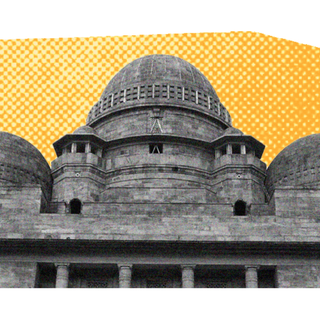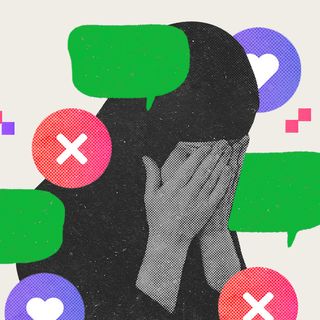
Indian Medical Body May Replace Doctors’ Hippocratic Oath With an Ayurvedic Oath
If enforced, doctors of modern medicine will be taking an oath invoking casteist and sexist sentiments.
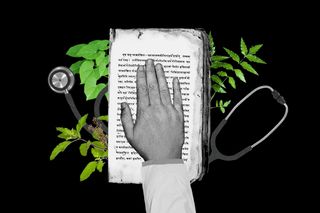
For several decades, doctors of modern medicine have taken the Hippocratic Oath, an ethical code by which medical students across the world are bound. Now, a regulatory body plans to replace it with an oath in reverence of Charak, known as the father of Ayurveda. The idea is deceptively simple: to swap out “foreign” medicine values with the Indian “traditional” system of healing.
The proposal came from the undergraduate board of the National Medical Commission (NMC), a regulatory body supervising medical education, in a meeting conducted last week. If enforced, medical students will be taking an oath of integrity, during their white coat ceremony, in the name of the father of Ayurveda. “Modern medicine has a history of not over 200 years. Why should we continue to make doctors take oath in the name of a Greek physician when India has a rich past in medicine? This has been discussed in several meetings. It should be a matter of pride to take oath in the name of Maharshi Charaka,” said a source who didn’t wish to be named to Times of India. In other words, it is a step to inculcate “Indian values.”
This not only ends a decade-long rite of passage — but also means conflating alternate medicine with modern professional medicine.
You don’t have to be a doctor to know of the Hippocratic Oath. The historic code of ethics has flowed through Greek philosopher and physician Hippocrates’s time. The Charak Shapath is the oath found in Charak Samhita, a text on ancient Indian medicine which Charaka authored. Both in theory ask students to treat patients to the best of their abilities and focus on maintaining privacy.
“The Maharishi Charak Shapath has not been uploaded on the NMC site yet. I’m still waiting to see what they officially upload,” Dr. Shivangi Shankar tells me.
But the content of the Shapath found on Google is found wanting in some regards; the language, for instance, is evidently casteist and sexist. The NMO oath mentions ‘Dwij’ in the very first line. “Dwij as a term is rooted in casteism so Taking an oath as a ‘Dwij’ is casteism. There is no justification for this,” a doctor noted. The other code of conduct mentioned in the Shapath: “I (especially a male doctor) shall treat a woman only in the presence of her husband or a near relative).
“The directions asking to follow the commands of the ‘Guru’ without questioning him is against the views of modern medicine. The Charaka Shapath also encourages caste discrimination,” said Indian Medical Association Chairman Dr. M Muraleedharan.
“The oath doctors take cannot be rooted in oppressive terminology. Even if Dwij is removed from its original problematic meaning, I think the positioning of doctors as superior beings is arrogant,” Dr. Shankar says. “We need to take a more grounded approach.”
Related on The Swaddle:
The Shapath available online is the one used by the National Medicos Organization, a body affiliated with the Rashtriya Swayamsewak Sangh (RSS) that has been a longstanding advocate of replacing the Hippocratic Oath. According to reports and confirmations by different colleges, the RSS has held programs earlier where it has administered the oath to medical students. Even some medical colleges have individually been using Charak Shapath over the Hippocratic Oath.
The deliberation revives the rift between “traditional” and “western/modern” medicine. Arguably, traditional medicine has an important place in wellness — partly because of a lack of access to healthcare. But misplaced belief and dismissal of modern medicine, in principle and application, perniciously devalues science and medicine.
The effort to incorporate Ayurveda and Ayurvedic practitioners within professional medicine reared its head during the pandemic. In February last year, IMA doctors staged a hunger strike after the government issued a notice allowing Ayurvedic practitioners to perform specialized surgery. Many government-issued Covid19 guidelines have included unproven alternative medicine as a way of recovering from the virus. In June last year, doctors protested Baba Ramdev’s statements deriding evidence-related medicine. Ramdev is a spiritual leader and the founder of Patanjali.
The proposal for replacing the Hippocratic oath was floated with the intention of reinforcing Indian values “Charak belonged to our motherland— oath-taking to be conducted during White Coat Ceremony in local languages/vernaculars,” according to a Hindustan Times report. Other things discussed in the NMC meeting include making a 10-day yoga course mandatory for medical students, where they will be taught Surya Namaskar, Pranayam, and meditation. “This is done to allay depression, suicidal tendencies,” noted the minutes of the meeting.
People in favor of the replacement argue the spirit is the same, or that it may speak to Indian doctors more. There is also the rhetoric of “decolonizing” Indian doctors. “We should be proud of our ancestry. We have had a tradition of healing for thousands of years. We inherited medical education from the British and have hardly made any changes since. It’s good we will take oath from now in our ancestor’s name rather than in a foreigner’s name,” said cardiac surgeon Dr. Devi Shetty.
The code of conduct for every medical practitioner should rely on access and education. And arguably, the Hippocratic Oath is outdated too. “It is moot to say we should not be listening to Hippocrates but our own pioneers. Hippocrates is also outdated today. Our ethics today are very different from what these founders of medicine thought fit. As they should be,” points out Dr. Shankar. “I believe India has enough wisdom today, we are quite capable of looking ahead instead of backward.”
She remembers taking the WMA Declaration of Geneva as a good example. It promises the health of the patient to be the first consideration; to protect patients’ privacy; or not permitting age, creed, ethnic origin, gender, political affiliation, “sexual orientation, social standing or any other factor to intervene between my duty and my patient.” All integral things.
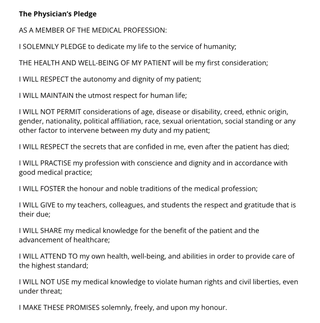
“I hope that the government will consider this and come up with something all doctors can stand for.”
For now, members of the committee have said the proposal will be discussed before a notification is made. Here are the two oaths, detailing the asks they make of modern doctors.
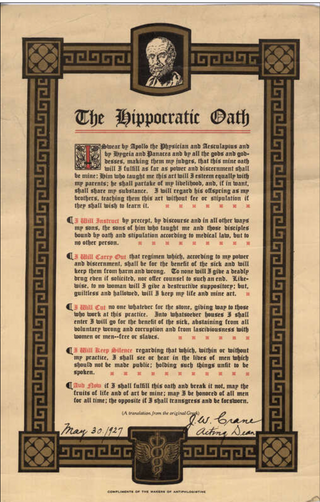
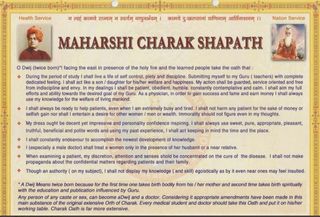
Saumya Kalia is an Associate Editor at The Swaddle. Her journalism and writing explore issues of social justice, digital sub-cultures, media ecosystem, literature, and memory as they cut across socio-cultural periods. You can reach her at @Saumya_Kalia.
Related

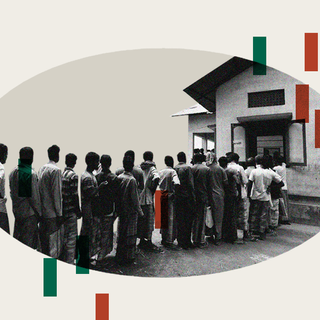
Indian Govt Has No Centralized Data on the People Living in Detention Camps
